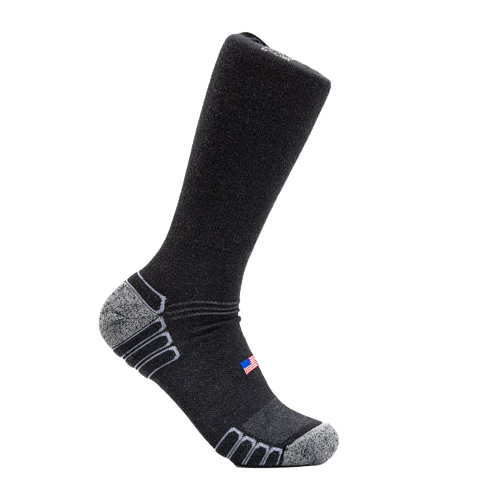I used to hem and haw over whether I should be wearing thick socks or thin socks with my work boots.
The answer to this question isn’t as simple as you might think: it’s not a matter of seasons. Yes, you should have a more lightweight work sock and a heavyweight work sock, too. But it’s not like heavy = winter, and light = summer.
That’s a factor, but it’s just one of many points to consider when choosing between a thinner and a thicker pair of socks to rock on the jobsite.
Is it Better to Wear Thin Socks or Thick Socks with Work Boots?
1. Comfort: Which Socks are More Cushy?
When it comes to pairing socks with work boots, comfort is essential. So, let's weigh the pros and cons of thin and thick socks in terms of coziness:
Thin Socks:
- Lightweight and breathable
- Perfect for warmer climates or those with sweaty feet
Thick Socks:
- Provide excellent cushioning and support
- Ideal for colder weather and long hours standing or walking
- Help prevent blisters and chafing
Winner: Thick Socks for their superior cushioning and support, especially if you're on your feet all day. We recommend the Camel City Mill Heavyweight Wool Work Socks for maximum comfort.
2. Fit: Sizing Up the Sock Situation
Does sock thickness affect how your work boots fit? Absolutely. Let's take a look at how thin and thick socks stack up:
Thin Socks:
- Easier to fit into tight work boots
- Less likely to cause pressure points or discomfort
Thick Socks:
- May require a larger boot size to accommodate extra bulk
- Can cause tightness and discomfort if not properly sized
Winner: It's a tie. The right choice depends on your work boot fit and personal preference. Just remember that proper sizing is crucial for both sock types.
3. Protection: Saving Your Soles
Work boots are designed to keep your feet safe, but your socks can also play a role in providing additional protection. Let's see how thin and thick socks perform:
Thin Socks:
- Less protection against impact or falling objects
- Not ideal for cold temperatures, which can lead to frostbite
Thick Socks:
- Offer better cushioning against impact and pressure
- Insulate your feet in cold environments and help maintain warmth
Winner: Thick Socks for providing that extra layer of defense your feet need on the job.
4. Durability: Built to Last
Nobody wants to buy new socks every other week, right? It's important to consider how long
your socks will last when paired with work boots. Let's compare:
Thin Socks:
- Prone to wear and tear, especially with heavy-duty work boots
- May require more frequent replacements
Thick Socks:
- Generally more durable and long-lasting
- Better able to withstand the rigors of daily wear and tear
Winner: Thick Socks for their staying power and ability to endure the demands of your work environment.
5. Moisture Management: Dry Feet are Happy Feet
Dealing with sweaty feet while you're working can be a real downer. Let's see how thin and thick socks handle moisture management:
Thin Socks:
- More breathable, allowing moisture to evaporate quickly
- Better suited for those with sweaty feet or in warmer climates
Thick Socks:
- May retain moisture, leading to damp feet and potential odor
- Opt for moisture-wicking materials (e.g., merino wool) to counteract this issue
Winner: Thin Socks for their breathability and ability to keep feet dry in sweaty situations. The Camel City Mill Lightweight is an excellent choice for moisture management.
6. Odor Control: Stinky Feet Begone
Nobody wants to be the person with stinky feet at the end of the day. Let's compare how thin and thick socks can help with odor control:
Thin Socks:
- Less material to trap odor-causing bacteria
- May need to be washed more frequently to stay fresh
Thick Socks:
- More material to absorb odor
- Opt for materials with natural odor-resistance (e.g., merino wool) to keep the stink at bay
Winner: It's a tie. Both types of socks have their own ways of tackling odor, so choose based on your preferences and needs.
Sock it to Me
After evaluating the factors above, it's clear that both thin and thick socks have their merits. Ultimately, the choice depends on your specific needs and preferences. Here's a quick summary to help you decide:
Choose Thin Socks if you:
- Work in warm climates or have sweaty feet
- Need better breathability and moisture management
- Wear snug-fitting work boots
- We recommend the Camel City Mill Lightweight Wool Work Socks for these scenarios.
Choose Thick Socks if you:
- Need additional cushioning and support
- Work in cold environments or stand for long hours
- Require extra protection against impact or pressure
- The Camel City Mill Heavyweight Wool Work Socks are a fantastic choice in this case.
Whichever you choose, always make sure your work boots fit well and are comfortable. Don't forget to consider sock materials like merino wool for added benefits like moisture-wicking and odor-resistance.
Remember, finding the perfect sock and work boot combo is crucial for those long days on the job. So, whether you opt for thin or thick socks, always prioritize comfort, fit, and protection. Happy feet make for a happy worker.
FAQs
Are thick socks good for boots?
Yes, thick socks are great for boots, especially when you need extra cushioning, support, or protection in colder environments or for long hours on your feet.
Do you need thick socks for steel toe boots?
Thick socks can provide added comfort and protection when wearing steel toe boots, especially if you're on your feet for extended periods or working in cold conditions.
How do you make your feet feel comfortable in steel toe boots?
To ensure comfort in steel toe boots, choose well-fitting boots, and pair them with socks that offer the right thickness for your needs, such as thick socks for extra cushioning and support or thin socks for breathability and moisture management.






